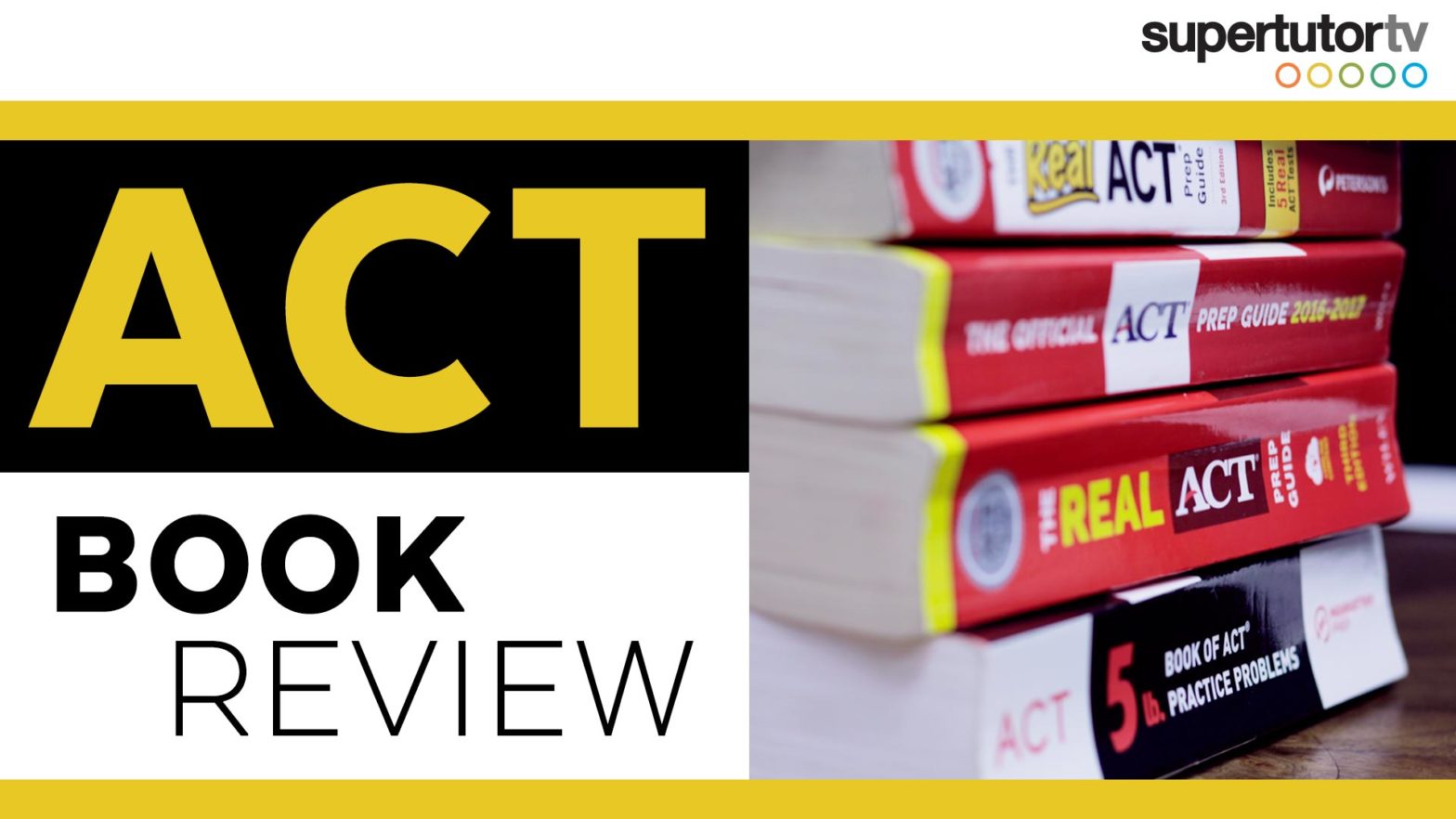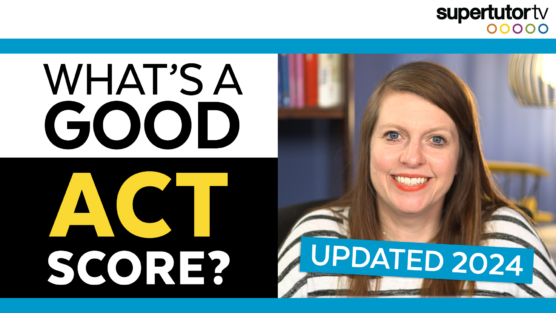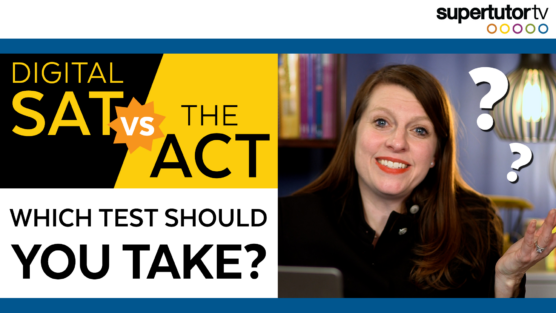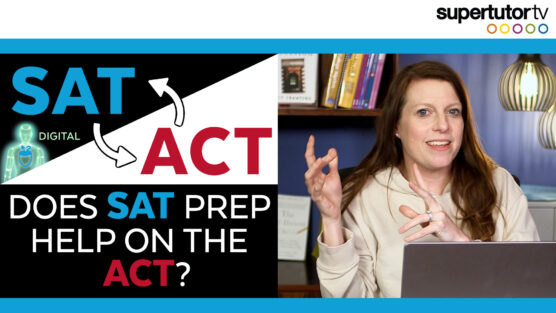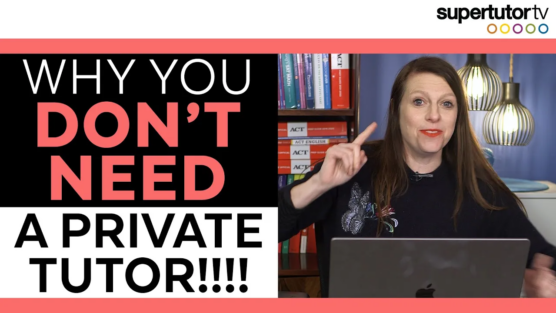Looking for the best books to study for the ACT® test? My name is Brooke– I’ve been tutoring the ACT® for well over a decade, and have both scored perfectly on the exam and coached a student to a perfect score.
Based on my years of experience tutoring, we’ve compiled this list to help you out.
ACT® Test Prep Books tend to fall in 4 different categories:
1. Official Prep Materials
2. Subject-Specific Strategy Guides (Often written by independent tutors)
3. All Around Strategy Guides
4. All-In-One Prep Books
DISCLAIMER:
Before we get started, it’s very important that you know that the ACT® has undergone changes in the last couple of years. Some of these books will reflect these changes better than others. They started rolling out in about April of 2014, and have continued through September of 2016. As a result, when you use a book, be sure you are aware of what applies and what might not.
Check out our blogs on the New ACT® and the NEW New ACT® Essay for a rundown of those changes. Some of these books may not reflect changes, but that doesn’t make them useless. Much of the test is the same, so I didn’t want to discount anything that didn’t have everything 100% right.
Official Materials
The BEST WAY to prepare for the test is to use REAL TESTS and learn from those real tests. Take a real test. Go over the answers. Learn from it. Official material makes up 70-80% of what I use with my students. We go over every practice test students take and use these as a method of figuring out what an individual student needs to work on. We also use them as a learning opportunity.
As we review each question we ask:
- What did I do wrong?
- How can I get this type of problem right next time?
- Are there any rules or skills I need to learn to do get the right answer on the test?
If you don’t have a tutor — we have an option for you
Our online prep videos go through EVERY question in the Official ACT® Guide (and in the REAL ACT® Prep Guide now out of print for even more prep).
If you buy our series on the new guide (The Official ACT® Prep Guide 2016-2107), we’ll send you the book for free.
Taking practice tests and then going over each question and learning how to better approach similar questions is one of the best ways to prepare for the exam.
Yes, you can get some tests for free online — but having the actual book(s) is helpful for a couple of reasons:
- It’s already printed out. It’s hard enough to make the time to study for this test, and having everything printed is better and easier. Practicing from a screen is not ideal (most students read more slowly and many of the techniques I teach involve taking notes on the page– which you can’t do on a screen).
- It includes answer explanations — the official books include typed out explanations will help you review, so you understand the solutions better. They aren’t as comprehensive as what you get with our course or a tutor but they are better than nothing.
So when it comes to buying official materials, it’s a bit confusing because ACT® just released a new book this past year. The old book, however, is still floating around in some bookstores and libraries. Here’s a run down of the two official guides you might run into:
1. The Real ACT®, 3rd Edition (Real ACT® Prep Guide) — out of print (Old book)
This is the old version of the ACT (pre 2014) — granted, the changes made to the exam since then have been mostly minor with the exception of the essay (brand new essay, dual reading passages, fewer science passages, new items in math, etc.). For a full rundown of what’s changed, again, check out our blogs on the New ACT® and the NEW New ACT® Essay. They’ll run you through the epic saga of changes to the test that have taken place in the last couple of years.
A few notes on this edition:
- 5 full length tests included (we offer explanations on our site to ALL five tests!)
- doesn’t include changes for 2014
- still good prep with with real tests for practice
- many questions (math especially) repeat in both the tests and the “bonus questions” of new book
- Test 4 & 5 are combined to make test #3 in new book (with the exception of the math section)
- Out of print but available used on Amazon or at your local library
My advice for using this book:
Skip all the math sections except test #5 (do that test :)), and use this book for English/Reading/Science with the exception of test #4 Reading & Science– wait on those and take in the new book, and test #5 in the English– again that’s in the new book, too.
2. The Official ACT® Prep Guide 2020
This is the updated guide– but it’s not perfect. A few tests are a recycled hodgepodge of the old book’s math sections (save for about 10 new questions per section reflecting test updates as of 2014-2016– mostly probability questions).
- Five “real” ACT® tests.
The first four exams appear to be identical to the previous editions of this guide. I’ve noted the form codes these were sourced from below in case you know of these past exams.
Test 1 (diagnostic): English, Reading, Science (Jun 2015 73C), Math (73C+10 random questions from The Real ACT® Prep Guide exams, mix of exams, and a few originals), (Code 16MC1)
Test 2: English, Reading, Science (Apr 2015 73G), Math (random questions from The Real ACT® Prep Guide exams, mostly from Exam #2, and a few originals), (Code 16MC2)
Test 3 :English (Test 5 from Real ACT® Prep Guide), Reading, Science (Test 4 from Real ACT® Prep Guide), Math (Many from test 4 from the Real ACT® Prep Guide, some random from that Guide, plus a few 73G questions and a few originals.) (Code 16MC3)
Test 4: June 2017 Code 74C (Code 18MC4), all sections
Test 5: Dec 2017 Code A10 (Code 19MC5), all sections - If you buy the prep course on our website, you get this book for free!
For our company’s internal reference spreadsheet on the questions that overlap between the books, we created this somewhat complicated pdf. Not guaranteeing it’s 100% accurate, but if you’re hard core this might help you squeeze every last problem out of these books without repeating.
I recommend getting this book (with our course 🙂) and doing every test in it! Then you can either get the old book and run those tests that don’t overlap OR use the bonus questions in the pdf.
Other sources for official tests:
For your convenience, we have the “officially” distributed practice tests from ACT® on our resources page. Many of them are the older, pre-2014 test, though the most recent test reflects the current form of the exam. Our trial version of the course includes explanations to the two most recent pdfs here.
You can also likely find more real tests with a Google search or on Reddit r/ACT®. Some have been uploaded illegally by dodgy foreign-hosted websites. We can’t vouch for these sites so proceed at your own risk with those.
Individual Section Strategy Guides
These are written by independent tutors and usually only cover one section of the test at a time. These are a good way to focus studying once have determined your weak sections (particularly for scores below 29).
English
1. Nielson Phu: The College Panda’s ACT® English: Advanced Guide and Workbook
- I generally like the exercises for practice. He tends to have longer practice sets than Meltzer and often more challenging problems. As a tutor I tend to use this book most often as practice, not teaching, is what I need most.
- He isn’t as awesome at categorizing and explaining rules as Meltzer. Sometimes he calls things by the wrong name or explains rules in a weird way— and other times he just shows examples of what is right and what is wrong without explaining what the rule at play is. Many can still learn from just seeing the right vs. wrong sentence, but if you need more explanation Meltzer might be a better pick for you.
2. Erica Meltzer: The Compete Guide to ACT® English, 3rd Edition
- Better at explaining the grammar rules and is a bit more accurate in her grammar know-how than Phu.
- Sometimes her exercises are a bit too easy (particularly her mock tests)
- Her practice sets also sometimes focus on one idea so much, that she doesn’t replicate some of the really tricky little questions that sneak into the tests at time.
Math
Book 2: Numbers, Stats, Trig and Geometry
1. Richard F. Corn: Ultimate Guide to the Math ACT® – available for purchase online only (self published)
- Shorter than either of our two guides
- Doesn’t cover every type of problem on the test
- More catered to people scoring about 26-29; not enough tough problems, nor teaching on the basics.
2. Brian Leaf: McGraw-Hill Education: Top 50 ACT® Math Skills for a Top Score, Second Edition
- Better for more introductory concepts (ideal for people scoring below 26)
- Divided by topic (each “skill” is a single topic)
- Not enough practice to prepare (only like 5 practice problems for each skill)
- May suffice for cramming and last minute preparation, not much else
3. Steve Warner: 320 ACT® Math Problems arranged by Topic and Difficulty Level, 2nd Edition: 160 ACT® Questions with Solutions, 160 Additional Questions with Answers
- organized by overall topic
- has no “practice sets” but instead is constant problem / solution / problem / solution format (for that reason I rarely use as a tutor)
- need more practice sets to lock in knowledge
4. Kaplan / Princeton Science / Math Workout / Barron’s Science and Math
- Annoyingly paired with science, so most math sections are barely more than 200 pages– not enough for all the content from 4 years of math you are required to know
- Not as organized or targeted as the other books, which makes it easier to waste time going over things you don’t need
- Clump too many types of problems together– sorted by “topic” but often “geometry” is as specific as it gets.
- Don’t cover every type of problem; many aren’t updated for 2014-2016 changes as of this blog post.
Reading
Erica Meltzer: The Complete Guide to ACT® Reading, 3rd Edition
Here’s a rundown:
- it gives timing strategies and lays out how to approach this section
- very thin book (be warned)
- most useful for the strategy (not so many practice problems– and the practice is less helpful than the advice)
Science
Michael Cerro: For the Love of ACT® Science: An innovative Approach to Mastering the Science Section of the ACT® Standardized Exam
- it’s thin but concise and strategy based
- focuses on how to be efficient in the test (save time for tough problems)
- broken down into question types (and the tools needed for each one)
Essay
1. Tom Clements: How to write a New Killer ACT® Essay: An Award-Winning Author’s Practical Writing Tips on ACT® Essay Prep— contains 9 prompts for practice and analysis
- Old book offered some good advice for organization or upping particularly low essay scores (i.e. 6/12 or below). I assume his new book recycles some of those tips.
- As a writer, Phu more insight into the nuances of the test
General Writing Guides
1. William Strunk: The Elements of Style
- free on the Kindle
- good for understanding “power” sentences and writing concisely
2. Roy Peter Clark: Writing Tools: 55 Essential Strategies for Every Writer
- tools for different ways to construct sentences
- explains writing techniques and the effects of the techniques
3. Cathy Birkenstein and Gerald Graff: They Say I Say: The Moves That Matter in Academic Writing
- explains how to create a conversation in writing (so important on the new ACT® essay!!)
- gives templates for academic writing and how to work with that style of thinking
“Overall” Strategy Guides
These are basically guides by independent tutors that don’t have any practice problems in them. They’re little booklets that are all about strategy. If you don’t have a private tutor, these books will give you access to some self study strategy and general rules of thumb that most tutors teach.
1. Elizabeth King: Acing the ACT®: An Elite Tutor’s Guide to Tricky Questions and Secret Strategies that Make a Big Difference
- King is a good tutor – she has helpful advice and practical insights
- Actionable strategies to self studying
2. Mike Barret: ACT® Prep Black Book: The Most Effective ACT® Strategies Ever Published
I personally am not a huge fan of this book, mostly because I’m not into the tone of voice of the writer (he seems as if he’s selling an infomercial-esque ACT® guide IMO)– you can download the first chapter for free from Amazon and see what you think.
- Has some good tips
- Tone of the book I personally found a bit exhausting (every tip he has is a SECRET or the BEST– it’s all a bit hyperbolic and I’m skeptical that all his advice is SO good — as a tutor I think some things work for some people, while other things work for others)
3. Ted Dorsey: Tutor Ted’s Guide to the ACT®
- I haven’t used this book but it has tutor strategy AND some practice questions
- It won’t reflect new changes to the essay or the “new” test
All-in-one Prep Books
Most students don’t need ANY of these– I rarely use any of these books with my students. The best thing to practice from is real tests and second to that is advice from experienced independent tutors who know what works. These books don’t have that.
They do have example tests to practice but I wouldn’t recommend turning to those unless you have exhausted your real practice tests.
1. Chris Arp: Up Your Score: ACT®, 2016-2017 Edition: The Underground Guide
- His book is written in a more energetic language than some competitors.
- If you really don’t have the energy, time or desire to deal with a different book for every section, this could be an OK overall guide.
2. Princeton Review: Cracking the ACT® with 6 Practice Tests, 2017 Edition: The Techniques, Practice, and Review You Need to Score Higher (College Test Preparation)
- If you’ve exhausted all real tests, Princeton are some of my favorite (particularly the science sections for added practice).
- If you’re getting other strategy guides by tutors, you can probably skip this book and go straight for the 1460 Practice questions one.
3. Manhattan Prep: 5 lb. Book of ACT® Practice Problems
- No strategy really here but solid practice problems throughout.
- These tend to be better written than Kaplan or McGraw Hill.
- Nice Trig section in the math if you need more Trig practice (but not subdivided by type beyond “Trig”).
- Lacks updates that reflect 2014+ test (unless it’s been revised since I ordered).
4. Ann Summers: Barron’s ACT® 36, 3rd Edition: Aiming for the Perfect Score
- Everyone thinks this is going to be the perfect book if they want a 36 — in many cases it’s just not.
- It’s ok for challenging yourself, but the questions are so hard it’s hard to get an accurate read on section timing (which is one of the elements so many of my students need to work on).
- I will sometimes use with students who don’t struggle with time, but rather struggle with challenging questions.
5. Kaplan Test Prep: ACT® 2016-2017 Strategies, Practice, and Review with 6 Practice Tests: Online + Book (Kaplan Test Prep)
- Not as strong as the others (tests just aren’t as tight to ACT® style).
- Would only suggest if you’re not getting what you need from other sources.
6. Stephen W. Dulan: McGraw-Hill Education ACT® 2017 Edition
- Also not as in the character of the test as it could be — I don’t use it.
7. Varsity Tutors: ACT® Prep Study Guide: Lessons, Strategies, and Diagnostic Tests
- It’s free— I haven’t really used it with students as I like printed books.
- If you’re on a budget you could check it out.
PHEW!
That was quite a list.
I hope you all felt this was helpful.
To make it easier for you guys, all books recommended on this blog post can be found on our Amazon page. HAPPY STUDYING!
FINAL NOTES:
If I haven’t mentioned a book, it’s probably because either (A) I don’t think it’s that useful (big brand individual subject books on the English and Reading fall into this category) or (B) I haven’t used it.
Please note this list includes Amazon affiliate links, which help support our blog and free YouTube Videos. No one has paid us to sponsor or include any books on this list.

